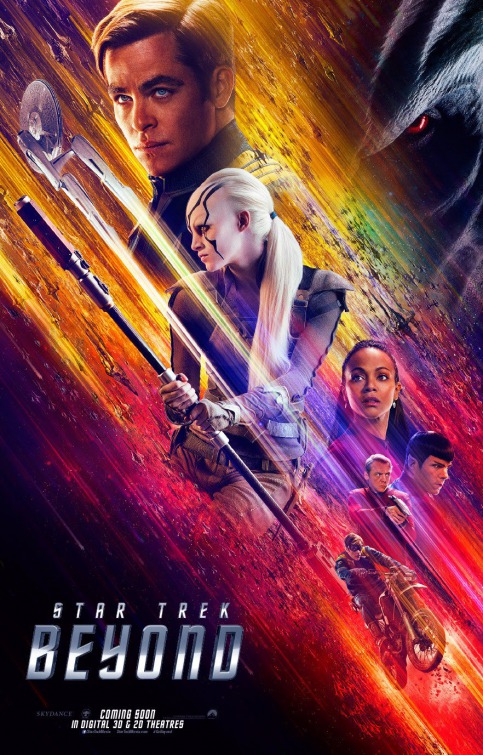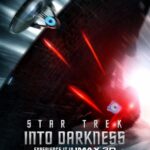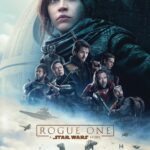The Frontier Pushes Back
Director
Justin Lin
Starring
Chris Pine
Zachary Quinto
Karl Urban
Zoe Saldana
Simon Pegg
John Cho
Anton Yelchin
Idris Elba
Sofia Boutella
Three years into their five year mission in deep space, Captain Kirk [Pine] is feeling a little lost, commenting that daily life trapped on the ship has become episodic (as the original series ran for three years, one could argue we are now in unchartered territory of this reboot universe and assume the contents of those missions would have taken place by now. So that malaise and fatigue is a nice place for our character to be in). After a diplomatic mission goes awry, the Enterprise and her crew resupply at a cutting-edge new Starbase called the Yorktown (which frankly looks like a hollow, unarmed Death Star). While there, Kirk discusses being reassigned and Spock [Quinto] receives news which leads him to believe he should be doing more to nurture the small community of remaining Vulcans. Before any solid conclusion can be drawn, a rescue mission is drafted and the Enterprise sets off again to assist. However, it is quickly revealed to be a trap and the ship is attacked by Krall [Elba], a mysterious alien hell-bent on securing a seemingly innocuous artefact from the Enterprise’s archival vault.
For those who may not know, JJ Abrams is not a Star Trek fan. More than that, he doesn’t like Trek at all. Subsequently his rebooted universe was dazzling, flashy and impressive but kind of missed what lies at the heart of Star Trek. There are those that believe this was for the good of the series and others who felt the action-centric redressing of the original canon was a bit of a perversion. I’m in a relatively unique position in that I agree with both. Personally, I really enjoy Star Trek and Star Trek Into Darkness but completely acknowledge how un-Star Trek they are. What’s more, Into Darkness created two huge problems by creating a device that can beam people from planet to planet (which frankly makes the whole ship-based exploration thing a bit moot) and resurrecting Kirk with Khan’s blood, which puts a bit of a dampener on the importance and finality of death. Subsequently, Star Trek Beyond pretty much ignores a lot of Into Darkness and brings back a lot of the core elements to what Star Trek is about and if I’m honest it both works and hinders the film as a whole. As a Trek fan I love what they’ve done here but if you were to watch all three in a back-to-back marathon the drastic shift in tone and development could easily throw you off.
Sequels very quickly stagnate if they don’t evolve. The characters need to grow or the audience will get bored of them but if they alter too much, fans won’t recognise the group and reject them; it’s a frustrating line to walk. As such, there will always be certain elements present in a Star Trek film; specifically Kirk encounters unfamiliar situations and has to decide on how to proceed based on the arguments presented by his emotional (Bones) and logical (Spock) influences. But after a while, that dynamic runs thin so for comic relief and additional support we turn to the other key crew members, namely Chekov, Scott, Uhura and Sulu, with varying degrees of success. Curiously, the hierarchy of importance draws parallels with the ‘other’ Star Trek 3, The Search For Spock: Scott is probably the most contributory character, followed by Chekov and Sulu proving themselves useful, leaving Uhura in a weird third-wheel state performing admirably with the entirely dismissive tasks she’s given. But the film at least makes an effort to break up the typical dynamic and pair up unfamiliar or unexplored combinations. The new additions fare better, in the form of protagonist Jaylah (who I will expand on in greater detail later) and antagonist Krall. Elba is very interesting as Krall but only at the end of the film. Without wanting to spoil any developments (like a lot of the social media advertising ended up doing) Krall started off as a relatively dull original villain with a rather tired and formulaic drive that developed into something genuinely interesting. And while I’ll explore that interesting development later, it does highlight one of the biggest problems with this movie.
Formula breeds tedium and blockbusters are nothing but formulaic. Really, this film boils down to the oft revisited setup of evil character needs to gather multiple artefacts to assemble a weapon which will wipe out life as we know it (usually with a sky portal over New York) and only our heroes can stop him/her/it. So from the very get-go we’re being served up something that is fairly stale, meaning the only redeeming features will be in the plan’s executions and the villain’s motivation and thankfully, by the runtime’s close, Star Trek Beyond manages to keep its head above water. But I have a bit of a gripe with this giant spacestation of theirs. Early on, the film establishes Yorktown as a beacon of Federation progress, a hub for intergalactic relations that can seemingly move around without the constraints of being fixed to any one alien race’s territory and yet it’s predominantly a bunch of white people. Something that irked me about Abrams’ first two Star Trek films is the lack of diversity in the extras. On the one hand you have films like Guardians Of The Galaxy that draws from all manner of CGI, prosthetic and colour palates to produce something that feels extremely alien. Then you have films like Star Wars which will populate specific locations with a cluster of alien races, usually each a unique race that won’t turn up again. This latest iteration of Star Trek seems to favour the latter mindset by treating us to a few rando races without a genuine alien presence for world building. In other words, your “Look at this kid! He’s got green skin and funny ears” does nothing to make me think that he belongs in this universe because he’s the only one of his kind. He could easily be a lost orphan for the amount of representation that happens here. I appreciate a lot of people will see this as really petty nit-picking but if I can count more green people than Asian people and combine every alien race and they’re all outnumbered 3 to 1 by white men, I’m going to be pissed off because this is fucking science fiction! I appreciate Earth is meant to be a huge part of the Federation but this base isn’t and I want to see aliens. More than that I want the fucking Star Trek aliens! You’ve got decades of material to work from so while I appreciate you like the cool idea of someone who looks like they have a conch for a head, throw in a goddamned Bajoran or something! Jesus!
While I didn’t have a great deal of confidence in Justin Lin, he actually managed something quite impressive. Yet there are still glaring flaws that need to be addressed. The man delivers on spectacle but admittedly not in a particularly original way. The space elements are pleasing, the interiors are nicely shot and the expository interactions are far from boring or out of place but the editing is so choppy and confused that a lot of that good work is lost. This could easily be down to poor editing work (which considering there were four editors credited, could have something to do with it) but it feels like shots were in fact missing and great narrative leaps have to be taken for the audience to get their heads around how a character got from A to B. But thankfully the sound team more than compensate for this with great effects and mixing, all of which is complimented by another nuanced and pleasing score from Michael Giacchino.
Despite these negative highlights, they are minor points and overall I really enjoyed this release. It feels like a real return to the world of exploration and discovery created by the TV series. Admittedly this might lose some of the new converts but if you’re going to add to the Star Trek universe, you might as well do it right. If a fourth release can combine the heart of this instalment with the grandeur of the other two, we’ll be on to a real winner.
Release Date:
22nd July 2016
The Scene To Look Out For:
**Major spoilers within**
One of Star Trek’s greatest achievements was to reflect the world we live in, challenging the problems of today. Want to talk about race relations? Star Trek can do it. Homosexuality, war, religious conflicts, inequality, Star Trek can address all these problems in the universe its set in without feeling overtly preachy. Where Beyond redeems itself most is the revelation of Krall’s true identity. Utilising a life-sustaining technology, Krall is in fact the product of decades of bitter resentment, gene splicing and madness and was, at one time, a Starfleet Captain named Balthazar Edison. Once this has been revealed, Kirk and Krall have a heart-to-heart confrontation wherein Krall explains he is a soldier who believes we earn our place through struggle and being born into war rather than peace he cannot stomach the idea of sitting down and breaking bread with his enemies. It’s something that’s really plagued our own existence with people to this day holding grudges from World War II against those who weren’t alive to give offence in the first place. It’s a great little development that elevates the entire film but admittedly it did feel a little TV tropey. I mean, Kirk really should have shot him with stun pulses until he stayed down, rather than waxing philosophical but what are you gonna do? People are going to monologue and others are going to take advantage of that.
Notable Characters:
Jaylah’s great. I really liked her personality, her passion and her visual look, all of which combined neatly to create a rounded character who is more than just a) a strong female character or b) a disposable side character. Wonderfully performed by Boutella, unlike Carol Marcus and her absurd “turn around” moment from Into Darkness, I would really hope Jaylah returns in future films as an active crew member. And let’s face it, for a set of characters so tightly-knit as these, that’s genuinely saying something.
Highlighted Quote:
“It is not wise to trivialise that which we do not understand. I think we can safely assume it is not a do-dad”
In A Few Words:
“A surprisingly divisive Trek release, trying to find a middle ground between all-out spectacle and the underlying message of what Star Trek stands for”
Total Score: 4/5
![The Red Right Hand Movie Reviews [Matthew Stogdon]](https://reviews.theredrighthand.co.uk/wp-content/uploads/2021/12/cropped-header1.png)




